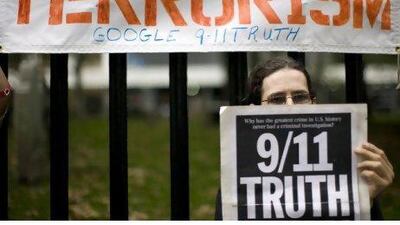Much has changed in the 10 years since Twin Towers fell. But for some people, one thing has not changed at all: their conviction that the attack was concocted by the US government.
In the face of all the official inquiries, expert testimony and media investigations, there are still conspiracy theorists who believe 9/11 was a plot cooked up within the Bush administration to provide a pretext for war in the Gulf.
Whatever one thinks of this thesis, there's no disputing its prevalence. According to a fascinating analysis published last week by Slate.com, when the popularity of the conspiracy theory peaked around five years ago, as many as one in three Americans suspected government officials had taken part in the attack. Since then, belief has faded, but even now polls suggest one in eight Americans harbours doubts about the official story.
How can so many people persist with such ideas in the face of so much contrary evidence? It is a question that has also long been asked by Nasa scientists, who are currently dealing with renewed assaults by conspiracy theorists who have for decades insisted the US space agency faked the Apollo moon landings and pocketed the federal funds.
Last week Nasa published its latest rebuttal, in the form of new images taken by a probe that has flown over three Apollo landing sites. The images clearly show the remnants of the lunar module, the "moon buggy" used by the astronauts and even their footprints.
Try telling that to the conspiracy theorists. According to them, the images are just the latest in a long line of fakes, put out to convince the gullible.
And this is the thing about conspiracy theorists in general. As anyone who has tried to engage them in argument will tell you, no amount of evidence seems capable of changing their minds.
It is tempting to dismiss such people as merely irrational. In fact, their reasoning highlights a little-known flaw in one of the foundations of science: the process of inference, by which beliefs are changed by evidence.
Most of us think we understand inferential reasoning. As evidence builds up, it becomes increasingly clear whether our initial beliefs need modification or not, and we are driven towards one conclusion or another.
The only difference between sceptics and true believers is that the former need more evidence to be convinced than the latter. In the end, evidence will always trump prejudice - at least, with rational people.
Surprisingly for something so basic, inferential reasoning was only properly formalised relatively recently. In the 1920s, the mathematicians Emile Borel and Frank Ramsey pointed out a connection between degrees of belief and the concept of probability.
In particular, they showed that the strength of belief could be captured on the same 0 to 1 scale as probability, with 0 representing unshakeable scepticism and 1 being total conviction.
Rational attitudes lie somewhere between these two extremes, with the impact of fresh evidence obeying a simple rule in probability called Bayes's Theorem.
Put simply, this shows that to gauge how to modify our initial level of belief in some idea, we need to compare the chances of getting the new evidence if our idea were true with those that would apply if it were false. If the evidence is more likely on the basis of our idea being true, then we're justified in increasing our initial level of belief.
This seems simple enough. For example, the new images of the Apollo landing sites are obviously more likely to exist if astronauts walked on the moon than if they did not, and so they should increase our belief in Nasa's argument - and decrease our belief in the silly conspiracy theories.
But a moment's thought reveals a problem. While it is of course pretty certain that these images would exist if Nasa had sent astronauts to the moon, it is at least conceivable they would also exist if Nasa were determined to maintain a cover-up. In other words, the existence of images alone provides no evidence either way.
Bayes's Theorem warns us that we must always set evidence in the context of the belief being tested. In the case of the images, most people find that attributing their existence to a hoax is much less plausible than the idea that they're genuine, and so - as Bayes's Theorem requires - they regard the images as boosting the case for the landings having really taken place.
Not so the conspiracy theorists, though. They are convinced Nasa routinely fakes evidence to hide the truth. And in that case, Bayes Theorem allows them to regard precisely the same evidence as backing their hoax theory.
Thus the laws of inference show that - contrary to what we might think - neither side is being irrational about the evidence. They reveal that the real difference between the conspiracy theorists and the rest of us is actually one of trust.
Most of us trust the standard view that astronauts went to the Moon - or, for that matter, that 9/11 was the result of a terrorist attack - and view all the evidence in that light.
Conspiracy theorists, in contrast, lack such trust, and so providing them with ever more evidence serves only to confirm their beliefs.
Those with a scientific training can find this assault on the power of evidence discomforting. Not surprisingly, there have been many attempts to keep "Bayesian" ideas out of science.
But there is no getting around their implication that, in the end, our beliefs about the nature of reality are shot through with subjectivity.
Not that you'll hear much about all this from scientists. Unless you're a member of one of their inner cabals, that is.
Robert Matthews is visiting reader in science at Aston University, Birmingham, England.

